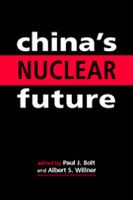Paul J. Bolt and Albert S. Willner, editors
In the face of significant changes in the contemporary geopolitical environment, China's longstanding policy of maintaining a minimal nuclear stockpile may also be shifting.
China's Nuclear Future provides a comprehensive overview of both the evolution of China's nuclear policy and the strategic implications of current developments.
The authors examine a full range of issues, from China's rising economic fortunes to the impact of the U.S.-led war on terror. Their assessment of the drivers and constraints that are transforming China's nuclear posture is key to understanding not only the country's possible nuclear futures, but also the broader issue of its role in world politics.
Paul J. Bolt is professor of political science at the U.S. Air Force Academy. Albert S. Willner is associate dean of the School of Liberal Arts at Georgia Gwinnett College.
No rights in South Asia."[Brings] important issues together into a single, up-to-date volume.... [A] foundational volume."—Andrew S. Erickson, The China Journal
"Offers the deepest publicly-available analysis of Chinese strategic thinking and nuclear program evolution."— George H. Quester, Parameters
"An exceptional volume, which should be read by both nuclear strategists and China experts."—Christopher Yeaw, Naval War College Review
"Provides cutting-edge empirical research on a difficult strategic question, while also situating the issue within a nuanced discussion of recent Chinese history and intellectual traditions. China's Nuclear Future contributes much to a new understanding of China's nuclear policy past, present, and future."—Andrew Oros, Washington College






